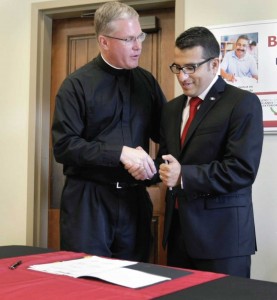
By BILL SHERMAN World Religion Writer
Published: 9/1/2012 2:07 AM
Last Modified: 9/1/2012 6:19 AM
“What’s a verb?”
That question, which came up in a recent English as a Second Language class in Tulsa, underscores the need for a new Spanish-language education program launched Friday by the government of Mexico and Catholic Charities of the Diocese of Tulsa.
In a ceremony at Catholic Charities, David Preciado Juarez with the Mexican Consulate in Little Rock, Ark., signed an agreement establishing the Community Plaza program here.
Many Tulsa-area Hispanics have trouble learning to read and write in English because they can’t read or write in their native language, said Heidi Hernandez, director of Community Plaza in Tulsa.
The free program, taught in Spanish, will give adults an opportunity to complete the equivalent of an eighth-grade education and receive a diploma from the secretary of public education of Mexico. It is open to all Spanish-speaking adults.
Hernandez said no one knows how many Tulsa-area Hispanics have poor reading and writing skills in Spanish, but the number is “really high.”
That is a huge barrier to their learning to read and write in English, she said.
“Our primary purpose in offering education in their native language is to provide a bridge to success in English as a second language,” she said.

Bishop Edward Slattery of the Diocese of Tulsa, who blessed the gathering in English and Spanish, said the program will create a bridge that will allow Hispanics who come to the United States to do well and contribute to society.
Under the agreement signed Friday, Mexico will provide the curriculum, much of it online, and Catholic Charities will provide the site for classes, administration of the program and volunteer teachers, said Deacon Kevin Sartorius, head of Catholic Charities here.
Adults who sign up for the program will be tested to determine at what level they start the education process, he said.
Classes will start Sept. 12 at the Catholic Charities campus, 2450 N. Harvard Ave., and will be offered 9:30 a.m. to noon, and 6 p.m. to 8 p.m. Mondays and Wednesdays.
Sartorius said he expected the program to outgrow the Catholic Charities classrooms, which can accommodate up to 100 students, and to expand to various locations around the diocese.
“There’s an incredible demand for it,” he said.
He said parents who complete the program will set a good example for their children and be better able to help them with schoolwork.
Receiving the diploma is nice, he said, but it is the knowledge they receive that will matter.
If they ever return to Mexico, however, the diploma could prove valuable, he said.
One person at Friday’s ceremony questioned offering the course in Spanish and said everyone should learn English.
“We agree with you on that,” Sartorius said.
“This is the foundational step. It’s the step that was missing.”
In an earlier interview, Sartorius stressed that before people can learn to read and write in English, they need to be able to read and write in their own language.
For this and nearly all of its programs, he said, Catholic Charities does not ask – and does not know – the legal status of people it helps.
“If you saw a hungry child, you’d feed him without asking if he was legal,” he said.
“In every service we offer, we treat individuals as people in need. If you are a person in need, you deserve Christ’s love … We’re doing this because it is right.
“An education is a basic element of our society and shouldn’t be denied to anyone,” he said.
Ninety percent of Catholic Charities clients are non-Catholic.
This is the first time the Community Plaza program has been offered in Tulsa. The 15-year-old program is available in Oklahoma City and also in two Oklahoma prisons and 437 other sites around the nation, including 94 in Texas and 67 in California.
A spokesman for the Oklahoma Department of Education said the GED test in Oklahoma can be taken in Spanish or English.
JoAnna Jamison, director of adult and community education for Union Public Schools, said Union has a partnership with Catholic Charities to administer the GED tests there in English and Spanish and to provide GED preparation instruction in English.
Original Print Headline: Breaking language barriers
Read more from this Tulsa World article at TulsaWorld.com

